ADEPT | Gagauzia 2016 | Presidential 2016 | Elections 2015 | Bashkan 2015 | Gagauzia 2012 | Political Parties
Stakes in the 2009 parliamentary elections
What do findings of the recent Barometer of Public Opinion reveal?
Social optimism level
The findings of the recent Barometer of Public Opinion (BPO) conducted under the auspices of the Institute for Public Policy (IPP) confirms stable perceptions of Moldovan citizens, as well as a number of new trends which are becoming more obvious. In order to meet necessities of estimating the state of things, the evolution of perceptions of respondents should be examined. Thus, the monotonous or oscillating evolutions may suggest trends or fluctuations. In this context, evolutions of responses over the last ten years, since the BPO polls are carried out, indicate the credibility level as well. The correctness of methodology regarding the formation of samples and interviewing of respondents is verified in the virtue of the fact that at least five sociological companies have participated in assessing and checking the findings of BPO surveys. Correlations of answers to various questions related to both hard-to-change habitudes and subjects that may be influenced by socio-economic and political situation reveal the correctness of findings as well.
As a rule, BPO polls begin with measuring the social optimism, which has an impact on perception of political issues. In this respect, Moldovans have been pessimistic rather than optimistic over the last years. Steadily, more than half of Moldovans fear that the country is moving towards a wrong direction and only approximately 30 percent think that the direction is right. This could mean that the protest potential including the electoral one should be bigger.
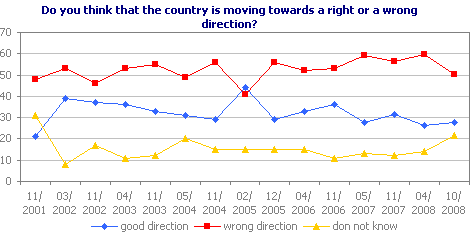
The discontentment with the country’s direction is rather linked to the current material condition of citizens, which depends on the quality of governance. The perceptions of people are based on earnings of families compared with expenditures, not statistics for precedent years as it is said for propagandistic purposes.
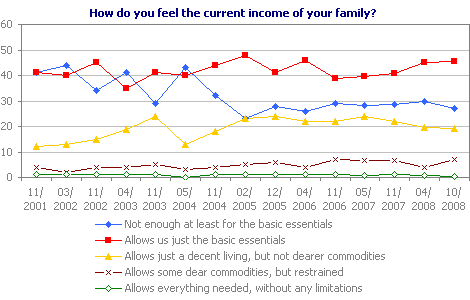
The following rule was confirmed during the previous five electoral cycles: electoral options of respondents are more or less stable in situations of relative socio-economic stability. In this regard, the most serious concerns of people motivate their political conduct. The table below reveals that the concern over price rise is already ahead the concern over poverty, though the latter is constantly a major worry so far. This concern has been manifested for the first time before the 2005 parliamentary elections, but it come to the foreground before the 2007 local elections. The concern about prices boost was probably the No.1 cause of the seriously decline in the rating of ruling party.
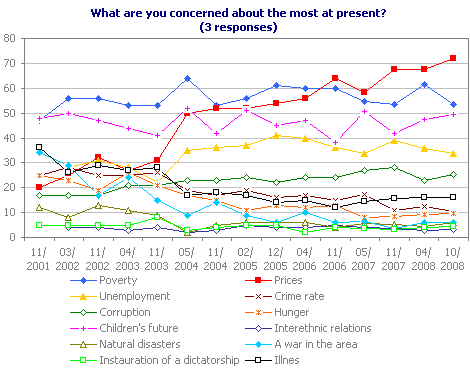
The problem of social optimism cannot be separated from the confidence in main public institutions designed to settle the people’s problems. In this respect, chances that the social optimism will redress before the spring 2009 parliamentary elections are very little, as the confidence in key public institutions — the Presidency, the Parliament and the Government — has constantly decreased after the 2005 parliamentary elections, creating a trend. Thus, it is noteworthy that the confidence in local public administration bodies controlled about 60 percent by the opposition is stable and much higher than the confidence in institutions of the central Government controlled by the Party of Communists of the Republic of Moldova (PCRM). It is important to note that in situation of a massive wave of information about the world financial crisis the trust towards Moldovan banks is on a slight decline and this may be a proof that the crisis did not affect Moldova yet as far as to alarm people.
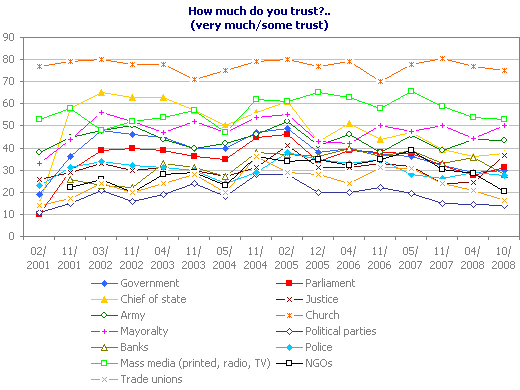
Trust towards parties and their leaders in the light of interest for politics
BPO findings often raise queries like why do people elect the ruling party over years if they do not like the country’s direction? The simplest answer would be that the majority of citizens consider the acting ruling party as “the least evil” and they are not confident that opposition parties would deal better with the existing problems. The No.2 query is why the number of undecided voters is constantly so high in Moldova (about 40 percent)? The answer to this question may be found in the table below.
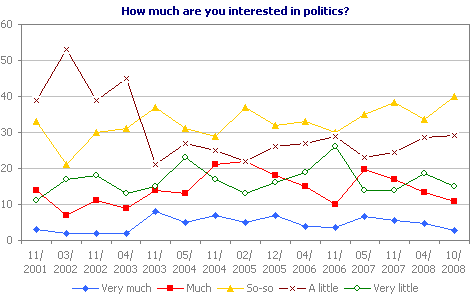
While approximately 45 percent of citizens are interested a little or very little in politics, why should one expect them give coherent responses to questions related to politics, how could they have clear intentions to vote? In this respect, the correlation between the percentage of those not very interested in politics and those undecided is not surprising. Also, these findings correlate with those on participation in elections (more than 60 percent of respondents are ready to vote in parliamentary elections).
BPO findings reveal that after the 2005 parliamentary elections the confidence of citizens in political parties correlates with the trust in public institutions represented by parties concerned.
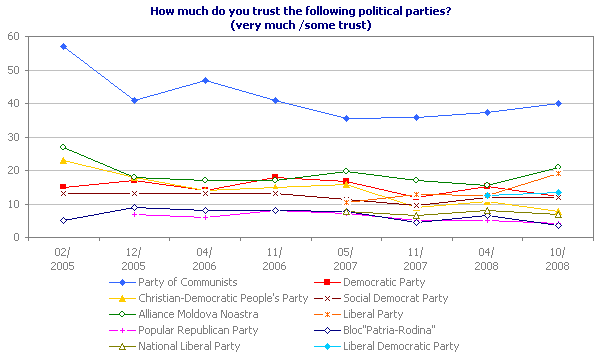
After the 2007 local elections the evolutions of perceptions clearly reveal the stabilisation of confidence in the PCRM; evident increase of confidence, over the error margin, in the Liberal Party (PL); decreasing rating of the Christian Democratic People’s Party (PPCD). As regards other parties, their trust ratings are in the common limits. The context requires mentioning the Liberal Democratic Party of Moldova (PLDM), which was registered a year ago and it is repeatedly part of political parties capable to claim representation in the Parliament, according to the BPO. The above-mentioned correlations are also effective for the evolution of trust ratings of political leaders.
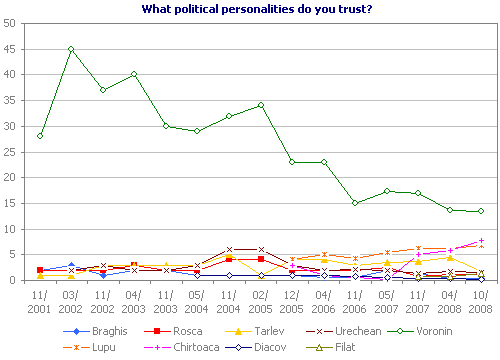
The most relevant indicator regarding the confidence in political leaders is the answer to an open question without the possibility to choose from a list. These responses clearly reveal the effects of dismissing former premier Vasile Tarlev, who is not as present in the media any longer as he was before. In this context, it seems that permanent assaults on Chisinau mayor Dorin Chirtoaca turn him in a symbol of the protesting electorate. The PCRM and its leaders know very well what the protesting wave is capable to do and what political profit it could bring when ratings of public institutions and public dignitaries are decreasing. It is true that the political messages and conduct of the Liberal Party cannot attract protesting sympathies from most of the political scene, being limited to the rightwing segment. In this respect, by joining politics on his own account, former premier Vasile Tarlev may attract the discontent left-wing voters. Administrative obstacles against Mr. Tarlev would be counterproductive, should such a trend materialise.
Intentions to vote “parties credited with chances”
A number of party leaders protest when the parties’ chance to accede to the Parliament are estimated on the basis of polls. Curiously, leaders of parties which gather 2–3-fold less votes at elections than the minimum number of party members needed to register a party protest the most. The cogent truth is that for mere arithmetical reasons, not all 28 parties registered in Moldova will accede to the Parliament, even if they were credited with equal chance to win at least 6 percent of votes each. Therefore, talking about “parties with great chance” and “parties with little chance” is normal and necessary. Given the inertia of electoral conduct, three factors shape speculations about the party’s chance:
- The results of the last national elections which are a key reference for estimating parties’ chance;
- The results of latest polls which indicate new trends influenced by the state of public affairs and activity of parties;
- The quality of electoral campaign, which depends on charismatic leadership, quality of offers, ramification of territorial branches, functional capacity and effectiveness of party mechanisms to communicate with electors, financial and organisational resources which “fuel” the gearing of the party machine and relations with media etc.
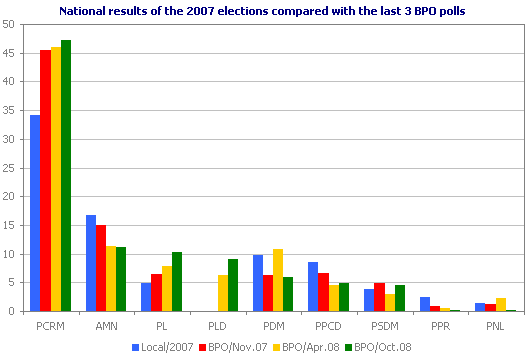
The last factor is so complex, being hidden from people so that it is implicitly manifested through the first two factors. New, emerging parties manifest themselves from the very beginning through actions aimed to capture the attention of the public opinion in order to be covered by polls, not vice versa. Even more, talks about “parties credited with chance” and those “without chance” should be organised to motivate the latter at least to revolt themselves in order to recall their existence to the public and inform citizens about this. Nevertheless, during the four campaigns for parliamentary elections held in Moldova starting 1994 the parties “without chance” have “stolen” 18–28 percent of the votes from electors, although was unrepresented in the legislative forum and raised up the number of mandates for “parties with chance”. In this respect, discussions about “parties with chance” may make citizens give a “useful vote”, but it is up to electors to decide. In general, it would be absurd to prohibit discussions about results of the previous elections and findings of polls because citizens could draw certain conclusions. These are official statistics or findings of sociological surveys, not manipulations. Those fearing that revealing real facts such as the party X gathers approximately three-fold less votes at elections than its number of members represents a manipulation of public opinion are hurting themselves because they doubt about discernment of citizens. It is less probable that electors would like such a conduct.
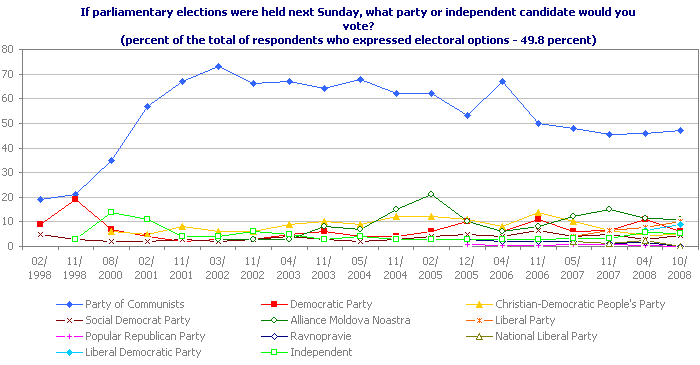
The table above, in correlation with the discussed data, reveals that intentions to vote the PCRM have been stabilised at a certain level after the 2007 local elections. Now approximately half (47 percent) of about 50 percent of respondents who expressed their voting preferences would vote the PCRM. As a rule, those who express the voting preferences are supporters of this party. In this context, the issue of undecided electors (about 40 percent) raises a major interest, being speculated very much before elections. It is impossible to predict the conduct of the undecided without conducting quantity researches in focus groups. However, one may presume that the conduct of undecided electors follows a certain rule in front of the ballot boxes. This assessment is probably effective in comparison with influent and well-known parties. As regards the PCRM, which has been ruling party for approximately eight years, citizens know what to thank it for or what to blame it for. In this regard, it is curios the proportion of the percentage of votes gained by the PCRM at national level during the three electoral campaigns since it rules the country in comparison to the percentage of electoral options expressed during polls before elections, which gives an almost constant coefficient of 0.7 percent. It could be called the “coefficient of influence on the undecided electors”. This exercise lacks a scientific support in statistical or sociological terms, but it generally reveals the conduct of undecided electors over the PCRM.
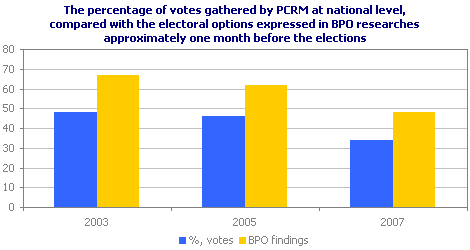
If the exercise and conclusions above contain a dose of realism and are not a consequence of bizarre coincidences, then one may state that since the percentage of those ready to vote the PCRM matches the percentage recorded before the 2007 local elections, the percentage of votes the PCRM would win if elections were held next Sunday would coincide with that from 2007 (approximately 34 percent). This exercise could be repeated before the spring 2009 elections (if the BPO is conducted), multiplying the percentage of intentions to vote the PCRM with the mentioned coefficient (0.7).
The same exercise could be done for the AMN, which has a relatively stable and known status like the PCRM. For AMN as main opposition force, the “coefficient of influence on the undecided electors” is approximately 1.3–1.4. It is easy to check: the Democratic Moldova Bloc (BMD), which was the pivot of AMN, garnered 28 percent of votes at the 2005 parliamentary elections, while the BPO conducted before the elections revealed that 21 percent of respondents planned to vote the BMD. At the 2007 local elections the AMN won approximately 17 percent of votes at national level versus 12 percent of electoral options revealed by BPO. The fact that the “coefficient of influence on the undecided electors” is higher (> 1) for the opposition and lower (< 1) for the ruling party means that the undecided electors particularly vote for opposition and the coefficient implicitly indicates the proportion.
As regards other parties, this exercise is useless, as their status is not very clear in eyes of citizens. Talking about the PCRM and AMN, the “coefficients of influence of the undecided” for both parties could decrease by the spring 2009 parliamentary elections, as the Centrist Union in Moldova (UCM) headed by former premier Vasile Tarlev could come into prominence on the leftwing of the political scene, the Liberal Democratic Party of Moldova (PLDM) and the Liberal Party (PL) are ascending, eroding the attractiveness of the two parties, so that the consequences of PCRM loosing the status of dominant party being predicable, while the status of the strongest opposition force of AMN is being contested. Thus, the undecided may massively turn to the emerging abovementioned parties.
Impact of elections on political stability
Political stability based on the PCRM domination is running short
Howsoever grounded the criticism on the Moldovan “political stability” in the last years would be, its effects are not the worst, if regarded in the light of the impact of chromatic revolutions in Georgia, Ukraine and Kyrgyz Republic on developments in these countries. However, the “Moldovan-style stability” based on the domination of a party with multiple authoritarian records will likely be over after the 2009 parliamentary elections:
- The results of the 2007 local elections revealed that the PCRM has lost its status of dominant party, garnering only about 34 percent of votes at national level. A clear declining trend is also confirmed by polls’ findings and the correlation of responses to a number of questions;
- After eight years of dominant governance, references of the PCRM to the “heritage of democrats” do not have the same effect. The international financial crisis will not favour the PCRM rule, even if affecting the Republic of Moldova less. On contrary, it may hit on the background of the people’s “tiredness” with PCRM governance, a fact mentioned by President Voronin himself at the PCRM modernisation congress in March 2008;
- New PCRM programmatic goals (pro-industrial, thus pro-modernist) set at the modernisation congress along with modified composition of the party’s governing bodies marked the beginning of estrangement of the “old guard” which contributed to the electoral triumph of the PCRM starting 1998, by “young scions” promoted to the higher-ranking bodies of the party. Efforts to adjust the party mechanisms after the modernisation may face difficulties related to suspicions that the dissemination of post-electoral political bonuses would particularly advantage the “young scions” to the detriment of the “old guard”, discouraging the latter and reducing its propagandistic efficiency;
- The second presidential mandate of PCRM leader Vladimir Voronin is almost over and he will not have the right to be re-elected in the next electoral cycle. Surveys show that the image of a leader and the public office he runs or wants to run motivate the electoral intention of Moldovan voters. Statements by President Vladimir Voronin that he has already chosen the person he would like to be succeeded by as chief of state raise confusion, indicating the vulnerability of the potential successor, should he/she be introduced on the political scene. This situation compared with that from 2001 and expressed by the slogan “The communists in the Parliament — Voronin President” fuels the distrust of party elites. They may fear about eventual political intrigues and surprises relating to promotion of staffs. Electors loyal to the PCRM would not like this situation;
- It will be hard to change the conduct of Moldovan electors the half a year left before the 2009 parliamentary elections because of inertia. The abuse of financial and media resources will unlikely help overpass the limit of the former capacity. The results of campaign to promote candidate Veaceslav Iordan to the office of Chisinau mayor in 2007 and the impact of some TV broadcasts aimed to libel opposition leaders proved that both the image-making campaign of the PCRM and the campaign to blacken opposition leaders reached the saturation level and rather generates repulsion. Lots of jokes about fortunes of ruling elites are a key indicator that there is no way to redress the situation through PR methods. It does not matter how real the jokes are, as the PR is helpless in front of the fascinating power of humour;
- After the March 2008 elections, the PCRM faction in the People’s Assembly of Gagauzia proved that the party is unable to reach a compromise, staking so far on the strategy “everything or nothing” typical to dominant parties.
Given the reasons above, a new type of political stability would be necessary after the spring 2009 parliamentary elections. As said on various occasions, a large coalition of at least 3/5 votes in the Parliament to examine in package the election of the chief of state would be necessary after the 2009 parliamentary elections, not a simple majority to elect the leadership of the Parliament and vote the cabinet of ministers. Relations between the PCRM and the acting opposition, as well as the quality of the latter are concerned as well.
Is the opposition able to produce political stability?
Being antagonised, dispersed, crushed by elation of its leaders, losing practical skills in key administration areas after failing to rule the country in the last 8 years, the opposition cannot make the Moldovan elector confident that by winning the elections, it could take over quickly and efficiently the control on socio-economic situation and European accession process. Two examples would be enough to point out the capacities and qualities of the Moldovan opposition. The first example is the way opposition parties have acted in front of obstacles introduced by latest amendments to the Election Code (in April 2008). Besides lamentations, good intentions and general discussions, opposition parties were incapable to take concrete actions in order to consolidate their positions and pass the obstacles. The second example is the adventures in the Chisinau Municipal Council (CMC), where opposition democratic parties were represented approximately 2/3 versus 1/3 representatives of the ruling party after the June 2007 municipal elections. The chaos in the CMC is eloquent for many district administrations. Evolutions in the CMC and other district administrations are influenced by the PCRM-controlled central government, but they also reveal the opposition’s characteristic.
Given these reasons, opposition parties should try revising their approaches and attitudes towards some matters. The experience of the 2001 and 2005 elections remains up-to-date for them. In the first case, the fragmented Parliament precluded the election of the chief of state, culminating with Parliament dissolution and dramatic change of the political configuration after the PCRM has gained constitutional majority at the February 2001 elections. In the second case, the desire to avoid the experience of 2001 has motivated some opposition parties to re-elect the PCRM leader as chief of state. Since then, the opposition is divided into “constructive” and “unconstructive” or “treacherous” and “principled”, depending on sympathies. This division may have an impact on political stability after the 2009 parliamentary elections, as three out of six opposition parties credited with chance to accede to the future Parliament — the PPCD, PDM and PLDM — are led by persons who re-elected President Voronin on April 4, 2005, that means they “betrayed”. Even more, the camp of “traitors” was completed last summer by the Social Democratic Party (PSD), whose municipal faction along with the PCRM and PPCD fellows helped dismissing the PL leader as CMC chairman. So, would the “principled” parties be able to cooperate with the “traitors” in order to make a large coalition?
This question makes sense, as the limits between compromises, even negative, imposed by realities and betrayals are mixed up deliberately for political profit. For example, the alternative to the April 4, 2005 “betrayal” was to block up the election of the head of state with unpredictable consequences of political destabilisation, when all 101 members of the Parliament reached the political consensus on the European integration. Since the “betrayal” poisons so far the relations between opposition parties, it is important to make clear what solutions did the “principled” parties propose to the eventual blockage in 2005. This is not a trivial question, if taking into consideration the fact that an eventual blockage is still possible in 2009 as well. Peculiarities of the 2005 elections were that in the virtue of results of the parliamentary elections the PCRM nominated two candidates to the office of chief of state while the opposition none. The obstruction by the opposition and organisation of new parliamentary elections a couple of months after the ordinary elections could have advantaged the PCRM more, so that to repeat the 2001 success. The PCRM has demonstrated its electoral force by winning 56 out of 101 seats, keeping being consolidated, motivated and holding all administrative levers to influence the repeated elections. At the same time, the opposition has split between the parliamentary and presidential elections which should be obstructed, and its components were fighting between them. By participating in repeated elections, the opposition would have run the risk to be punished by electors for organising the blockage and wasting public funds to hold repeated elections.
The arguments of the main opposition force AMN that its leader should be invited at the post-electoral negotiations to condition the election of the chief of state do not resist any criticism. The AMN did not recognise the validity of the parliamentary elections and participating in negotiations on consequences of an illegitimate action such as the election of the head of state by an illegally elected Parliament would had been at the limit of absurd[1]. Representatives of extra-parliamentary opposition parties, particularly the PL, have later justified the necessity of avoiding blocking the re-election of the PCRM leader as chief of state, though it keeps condemning the “betrayal”. The PL considers that the “betrayal” had an alternative, it should be “total” not “partial” and should be realised through the delegation of two representatives of every parliamentary faction to re-elect the PCRM leader and avoid the blockage.
Conclusions
- A series of factors show that the necessity to establish a large coalition will be unavoidable after the 2009 parliamentary elections. In this regard, the latest developments in Ukraine proved to what extent the political instability challenged by intestinal battles of the political class may jeopardise the functioning of public institutions and affect the strategic European integration objective.
- Free and fair elections are an indispensable precondition for post-electoral political stability, while the political stability is a precondition of an efficient European integration process. Even more, the political stability is the only way to realise the desideratum of President Voronin to become a “Moldovan Dang Xiaoping” after his second presidential mandate (interview published by RIA Novosti on May 22, 2007).
- A probable post-electoral political destabilisation following antagonisms between political parties would hit all without any exception. For these reasons, efforts are needed to relieve the inter-party relations in spite of the shortage of time. A careful examination of perceptions of the socio-economic condition and trends of electoral conduct of citizens reveals that the PCRM would be one of key beneficiaries should the inter-party relations be relieved.
- Removing electoral barriers related to the too high electoral threshold and ban of electoral blocs would raise the chance of eventual PCRM partners to accede to the future Parliament. Surveys reveal clear trends of decline for eventual partners of the ruling party. On background of the risk of centrist parties to fall down, the rising rating of the liberal parties irreconcilable in their relations with the PCRM and the “traitorous” opposition would complicate the fulfilment of a wide compromise on election of the future chief of state. Normally, the “principled” parties would avoid alliances capable to make them “traitorous”, as well as alliances with “treacherous” parties.
- Although the political race has its rules, the opposition parties would help much each other should they give up certain methods which antagonise them more, burning the bridges for eventual partnerships and preparing indeed eventual PCRM allies among their own members.
- The PCRM has an excellent pretext to remove electoral barriers for the opposition by giving green light to recommendations by the Venice Commission from the recent report on electoral legislation of Moldova. In this respect, state authorities should also remove the barriers for registration of changes to the parties’ documents after adoption of the new law on parties.
- The barriers the governing authorities raise against registration of the association “Russia’s Friends in Moldova” headed by former premier Vasile Tarlev, as well as against confirming the election of Tarlev as UCM chairman affect Moldova’s image essentially. Believing that a person whom the PCRM majority has entrusted to lead the Moldovan Government for 7 years is incapable to respect some formal requirements needed to register an NGO or to be elected as head of a party reaches the limit of absurd. In the event one would absurdly admit that the former premier and his highly-qualified lawyers are incapable to respect the necessary requirements, what kind of legal norms on functioning of NGO and parties does Moldova have since the most longevous prime minister in its contemporary history cannot respect them? Such things happen when the UMC headed by former premier Tarlev could become the most natural coalition partner of the PCRM.
- Admitting an eventual post-electoral political destabilisation when Moldova faces the separatist conflict in Transnistria would prove an unedited irresponsibility. In the current regional political conjuncture the Tiraspol regime is seeking arguments to make the Russian Federation treat it like the separatist enclaves in Georgia. In this regard, eventual arguments of Tiraspol that it does not have anybody to discuss conflict resolution issues in Chisinau because of the uncertain crisis would provide a supplementary pretext to Russia to help its clients. Thus, Russia’s influence would grow, reducing the power of the EU and U.S. which equilibrate the first. This way, the eventual destabilisation would anchor Moldova more on the “grey area”, reducing its little opportunities to approach the EU as soon as possible. A possible deception of European institutions with the lack of progress and incapacity to ensure a political stability could cut the interest and reduce the community support for Moldova.
- In the light of all abovementioned facts, key political parties should publicly reconfirm the validity of the political consensus on the European integration and take appropriate actions.
- ↑ AMN Chair Serafim Urechean stated on June 29, 2005 that he has contested in the European Court of Human Rights the decision by the Constitutional Court of Moldova to validate the March 6, 2005 parliamentary elections and the ECHR has accepted his application (Info-Prim, 29 June 2005).


